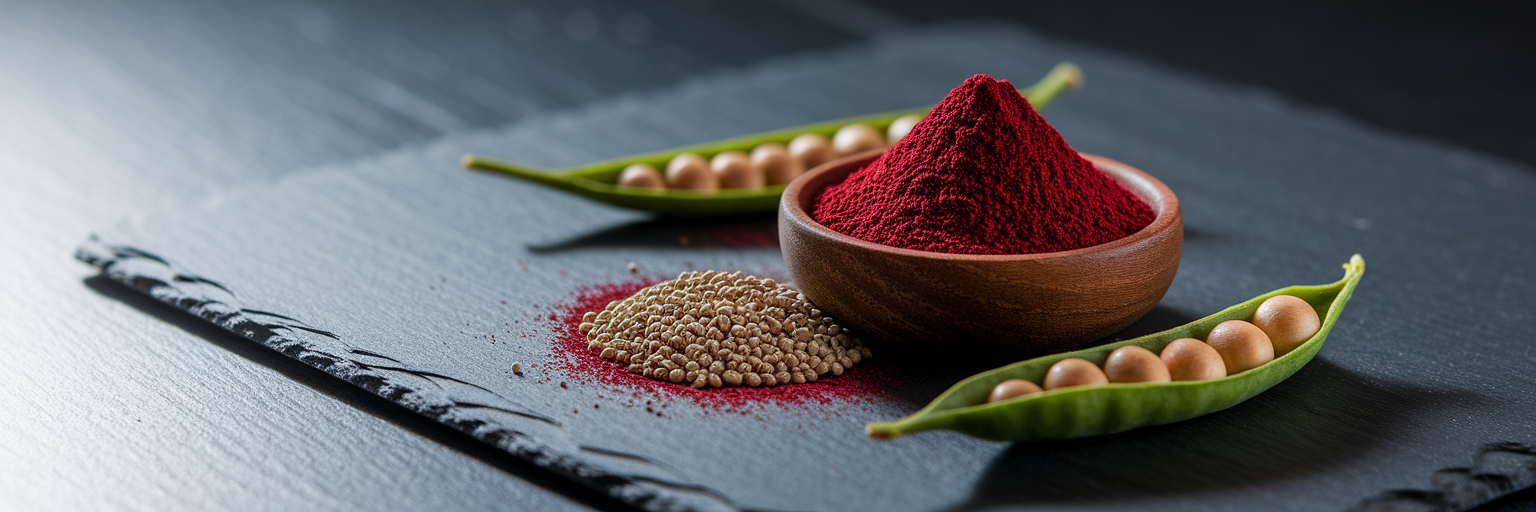Why Athletes Are Turning to Plant-Based Protein
It seems like every week another elite athlete announces they’ve switched to a plant-based diet. This isn't just a trend, it’s a strategic move for a competitive edge. Vegan protein has officially moved from a niche corner of the health food store to the main stage, becoming a top choice for serious fitness enthusiasts and everyday gym-goers alike.
But let's be honest, you might be wondering, "Does it really work as well as whey?" or "Is it enough to build serious muscle?" These are fair questions, and thankfully, modern science has some clear answers. The appeal of plant-based options goes beyond just muscle repair. For anyone with dairy sensitivities, the digestive relief is a huge plus. Others are drawn to the sustainability factor, wanting to fuel their bodies without a heavy environmental footprint.
The great news is that you no longer have to choose between performance and your personal values. The plant based protein benefits are compelling, offering a powerful way to recover and rebuild. To make the best choice for your goals, understanding the different types is key, which is why we put together a guide on the best protein powders to help you navigate your options.
The Science of Plant-Powered Muscle Synthesis
Let’s talk about what happens after a tough workout. Your muscles need to repair and rebuild, a process called Muscle Protein Synthesis (MPS). Think of it as the construction crew that comes in to fix the micro-tears in your muscle fibers, making them stronger than before. To do their job, this crew needs a full set of tools, known as Essential Amino Acids (EAAs). A protein is considered "complete" when it contains all nine of these essential building blocks.
For years, a common critique was that most single plant proteins were "incomplete." But that's an outdated view. The modern solution is simple and effective: strategic blending. By combining complementary protein sources, like pea protein (which is rich in the amino acid lysine) with rice protein (rich in methionine), formulators create a complete and powerful amino acid profile that stands toe-to-toe with any animal-based protein.
One of the most important amino acids for MPS is leucine, which acts like the foreman on the construction site, essentially flipping the "on switch" for muscle repair. As News Medical reports, modern plant-based protein blends can absolutely match whey for muscle recovery, as long as they contain a sufficient amount of leucine. Through smart formulation, today's vegan powders provide everything your body needs for effective plant based muscle building, making the old debates a thing of the past.
Beyond Protein: The Anti-Inflammatory Edge

Effective recovery is about more than just rebuilding muscle tissue. It’s also about managing the inflammation that causes that familiar post-workout soreness, often called Delayed Onset Muscle Soreness (DOMS). This is where plant-based proteins offer a unique advantage that goes beyond just their amino acid content.
While dairy proteins get the job done for muscle synthesis, they don't come with the added wellness perks found in plants. High-quality vegan protein powders are often packed with phytonutrients and antioxidants, which are natural compounds that help your body combat the oxidative stress caused by intense exercise. Think of them as your body's support system for calming things down after you've pushed it to the limit.
Many of the best post workout recovery drink formulas include powerful, plant-derived ingredients specifically for this reason:
- Tart Cherry Extract: As noted in a Bon Appétit article, research shows this ingredient can significantly reduce muscle soreness and speed up recovery.
- Turmeric (Curcumin): This golden spice is a well-known natural anti-inflammatory that supports joint health and reduces exercise-induced inflammation.
- Ginger: Often included to help soothe the digestive system, ginger also has powerful anti-inflammatory properties.
This holistic approach makes plant protein not just an equivalent to dairy, but a potentially superior choice for total body recovery.
Understanding Plant and Dairy Protein Differences
The whey vs plant protein debate is a common one in fitness circles. For a long time, whey was considered the gold standard, and for good reason. It’s a byproduct of cheese making, naturally contains a complete amino acid profile, and is absorbed quickly by the body. It has a proven track record, and we have to give it credit for that.
However, the game has changed. As we've seen, modern plant protein blends now offer a complete amino acid profile that rivals whey. But the differences that matter most often come down to your personal experience. One of the biggest differentiators is digestion. Many people who experience bloating, gas, or general discomfort with whey find that plant-based proteins are much gentler on their system. This is a huge win, because a protein powder you can take consistently without side effects is one that will actually deliver results.
On top of that, plant proteins come with bonus nutrients like fiber and antioxidants that you won't find in whey. And for many, the lower environmental footprint of plant-based agriculture is a deciding factor that aligns with their health-conscious lifestyle.
| Factor | Whey Protein | Modern Plant Protein Blends |
|---|---|---|
| Amino Acid Profile | Naturally complete | Complete through blending (e.g., pea + rice) |
| Digestibility | Can cause bloating/discomfort for some | Generally easier to digest, hypoallergenic |
| Added Wellness Benefits | Primarily protein-focused | Rich in fiber, antioxidants, and phytonutrients |
| Environmental Footprint | Higher resource and land use | Generally lower environmental impact |
Note: This table compares general characteristics. Individual experiences may vary based on the specific product and formulation.
Maximizing Your Post-Workout Recovery

Having the right protein is one thing, but using it effectively is what truly accelerates your results. A smart strategy for vegan protein for muscle recovery can make all the difference. Here’s a simple plan to get the most out of every scoop:
- Get the Dose Right: Aim to consume 20-30 grams of protein after your workout. This amount is widely considered optimal to kickstart the muscle repair and rebuilding process without overloading your system.
- Mind the Timing: You’ve probably heard of the "anabolic window." While it might not be as short as once believed, it’s still a good idea to have your protein shake within 30-60 minutes after finishing your session. This ensures your tired muscles get the amino acids they're craving right when they need them most.
- Think Beyond the Shake: A single post-workout shake is great, but it isn't a magic bullet. For the best results, aim to space your protein intake evenly throughout the day. This provides your muscles with a steady supply of amino acids for continuous repair and growth.
- Power Up Your Shake: To really supercharge your recovery, blend your protein powder with a source of fast-digesting carbohydrates, like a banana or a handful of oats. This helps replenish your depleted energy stores (glycogen) while the protein gets to work on your muscles. For inspiration, you can find some great ideas in our post on 3 easy vegan protein recipes, using a delicious base like our Chocolate Vegan Protein.
Taste, Texture, and Today’s Vegan Powders
Let's address the elephant in the room. If you tried vegan protein a few years ago, you might have been left with a gritty, earthy taste in your mouth. We've all been there. The good news is that the plant-based protein world has undergone a massive transformation.
Thanks to innovations in processing, like micro-milling, today's powders have a silky-smooth texture that mixes beautifully into water, plant milk, or smoothies. Gone are the days of chalky shakes you have to choke down. Formulators have also gotten much smarter about flavoring. Instead of relying on artificial sweeteners that leave a weird aftertaste, the focus is now on natural, delicious options like monk fruit and stevia.
The market now offers some of the best vegan protein powder options we've ever seen, with incredible flavors that you'll actually look forward to drinking. With proven effectiveness for muscle recovery, a smoother digestive experience, and added wellness benefits, plant-based proteins are an amazing tool for anyone serious about their fitness. We invite you to explore the full range of delicious and effective options in our collection and see for yourself how good plant-powered recovery can feel.



